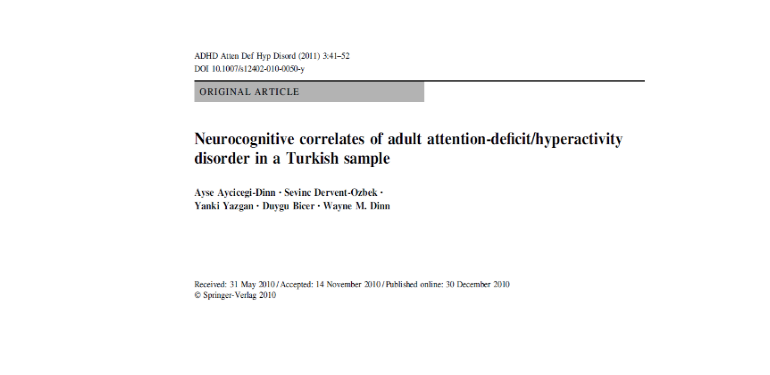We established a neuropsychological testing profile among Turkish adults presenting with ADHD controlling for general intelligence and comorbid psychiatric conditions. Adults with ADHD frequently present with comorbid conditions (e.g., mood and substance use/abuse disorders) that may have a detrimental impact on neurocognitive function. Hence, we excluded patients with ADHD meeting criteria for comorbid psychiatric syndromes. A comprehensive neuropsychological test battery was administered to adults with ADHD attending a general psychiatry clinic in Istanbul, Turkey, and healthy control participants. Adults with ADHD demonstrated performance deficits on tests of attention, information processing speed, and general and working memory. Patients with ADHD also reported a significantly greater number of symptoms associated with frontal lobe syndromes (i.e., dysexecutive symptoms and disinhibition). Patients with ADHD demonstrated rather striking deficits on tests of verbal and nonverbal memory. Once information was encoded, however, patients with ADHD do not demonstrate significant information loss. Patients with ADHD and healthy controls did not differ on tests of alternation learning, inhibitory control (error rates), and ToM skills.Findings support the contention that dorsal-prefrontal (rather than ventral-prefrontal) dysfunction is associated with adult ADHD. Unexpectedly, groups did not differ on executive control and fluency tasks. Yet patients with ADHD obtained substantially higher scores on a self-report measure of executive dysfunction. This suggests that dysexecutive symptoms among patients with ADHD in the current study do not reflect set-shifting or organizational deficits. Rather, symptoms may reflect attentional and working memory deficits as well as diminished information processing speed.
Keywords: Adult attention deficit/hyperactivity disorder (ADHD), Neuropsychological testing, Prefrontal function, Turkish

